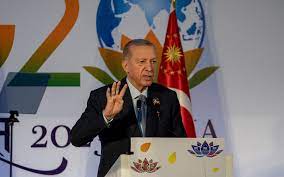Is Turkey’s bid for EU membership over?

Brussels: Recent remarks by Turkish President Recep Tayyip Erdogan have raised the prospect that Turkey could sever ties with the European Union.
Speaking on Saturday in the wake of a resolution adopted by the European Parliament (EP) on September 13, Erdogan said he could break with a bloc that Ankara has hoped for years to join, but concrete steps have been few and far between, and accession talks are effectively frozen.
The EP resolution adopted a report published by the European Commission last year and said that Turkey’s EU accession process “cannot be resumed” without a “drastic change of course” by Ankara.
Erdogan responded by accusing the bloc of “making efforts to sever ties with Turkey”, adding: “We will make our evaluations against these developments, and if necessary, we can part ways with the EU.”
The resolution also made several criticisms of Turkey, including of the elections held in May, human rights issues and its relationship with Russia.
For its part, Turkey’s Ministry of Foreign Affairs said the resolution included “unjust accusations and prejudices”.
“This report … is a reflection of the European Parliament’s usual shallow and non-visionary approach, both in its relations with our country and the future of the EU,” the ministry said.
It demonstrates how far the institution is “from developing the right strategic approach towards both the EU and our region,” it added.
Turkey has a customs union with the EU and has been a candidate for accession since 1995. Full membership talks, which were opened in 2005, have been in deadlock since the late 2010s, and diplomatic efforts to revive them have failed.
Mutual interests and how to serve them
The rhetoric in the EP’s resolution and the tone it used were in line with previous reports by the bloc when evaluating the political situation in Turkey, according to Sinan Ulgen, a senior fellow at the Brussels-based think tank Carnegie Europe.
“And in the same manner, it fails to produce a constructive way for the future of mutual ties and an alternative to their current negative course,” Ulgen said.
Although the EP has only limited influence on the bloc’s enlargement, it has requested the official suspension of the EU’s accession talks with Turkey multiple times in recent years in non-binding votes.
In addition, several member states, such as Austria, France and Germany have in the past called for Turkey to have a different form of partnership with the bloc rather than full membership.
Regardless, Ulgen said, it is not realistic to believe that Turkey’s full membership bid would officially end.
“It would be hard to get the necessary support within the EU member states to end Turkey’s membership bid as there are many countries, such as Spain, Poland, Hungary, Greece and Finland, that traditionally back the membership prospect and the talks,” he said.
The analyst said he also does not feel that Turkey would withdraw unilaterally from the process in spite of Erdogan’s remarks. “I don’t think that this is politically realistic or [will be] pursued by Ankara,” he said.
A formal end to Turkey’s EU membership talks is not in the best interest of either side, agreed Mensur Akgun, a professor of international relations at Istanbul’s Kultur University.
“Ankara and the EU, without terminating the membership process and tearing Turkey away from Europe, should establish a platform of equal partnership for the road ahead,” Akgun said.
“This partnership platform should be able to protect the sides’ economic and security interests and encourage Turkey towards democratisation and respect for human rights,” he added.
Ulgen sees a cooler relationship in the cards for Turkey and the EU. “The realistic option for the sides is to find an alternative way to cooperate without formally ending the membership talks, which will likely stay frozen in the current political climate,” he said.





